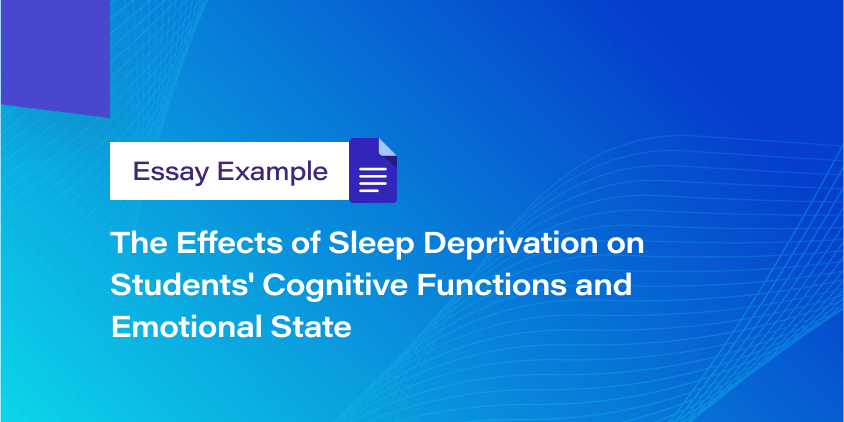The Effects of Sleep Deprivation on Students’ Cognitive Functions and Emotional State

Sleep is an important component in life of anyone. During sleep, the body rests, tissues are restored, and blood pressure is normalized. However, most students habitually prepare for their exams all night without rest or sleep. Sometimes, they do not sleep for so long that they develop a condition called sleep deprivation, which implies the denial of satisfaction of the body’s need for sleep and arises from a sleep disorder or intentional sleep deprivation. Sleep deprivation adversely affects the health, cognitive processes of the body, perception, memory, and decision-making. Study and the perception of processes become more energy-intensive, and concentration during work decreases. Sleep deprivation among students is a negative and, as a rule, specially created condition that adversely affects the efficiency of work and inhibits the processes of perception of information and the ability to make decisions; however, in some cases, when used for treating depression, such a condition can even have positive effects.
Sleep Deprivation
To study the effects of sleep deprivation, one should determine what it is and how it is expressed. Sleep deprivation is a condition in which a person does not sleep or react at all to external stimuli while still being able to perform their usual work. When the body has not received rest during sleep for 2-3 days, the effect resembles alcoholic or narcotic intoxication. The possible consequences of sleep deprivation are also similar to the consequences of the use of psychotropic substances due to their harm to physical and mental health, which might even lead to the development of psychosis. There is a feeling of euphoria, a hypo maniacal mood, a state of some muffled consciousness, and disinhibition in behavior.
Moreover, sleep deprivation can lead to hallucinations. This condition is even more dangerous to people with chronic diseases. For example, diabetes mellitus can develop due to the inability to absorb glucose during sleep, which might lead to disturbances in glucose metabolism. In case of problems with metabolism, a decrease in the production of the somatotropic hormone due to sleep deprivation leads to the replacement of muscle mass with fat while also impeding growth and physical development. Therefore, students need to have normal sleep since the growth and development of the body continue up to the age of 25-28 years. Thus, sleep deprivation is a state of no sleep or forced insomnia with specific signs, symptoms, and consequences.
Sleep Deprivation Effects
As a rule, sleep deprivation affects cognitive processes and performance negatively. According to Alhola and Polo-Kantola, sleep deprivation interferes with the functioning of certain brain areas and impairs cognitive characteristics that depend on the prefrontal cortex. These characteristics “include higher functions, such as language, executive functions, divergent thinking, and creativity”. After 24 hours of complete sleep deprivation, one can experience symptoms that are quite similar to those of schizophrenia. When deprivation is longer than 48 hours, the condition can be compared with the narcotic effect as the perception of the surrounding world changes completely. One may have a stable feeling of unreality, vivid hallucinations, or loss of a sense of time. Sleep deprivation compromises one’s ability to think critically, make decisions, and regulate emotions, which makes one more susceptible to anxiety and unmotivated emotional outbursts. However, as Mckenna et al. think, “Overall, risk preference is moderated by TSD, but whether an individual is willing to take more or less risk than when well-rested depends on whether the decision is framed in terms of gains or losses”. After 24 hours of sleep deprivation, one becomes more suggestible and emotionally irritable. In addition to reducing the effectiveness of the mechanisms of memory and cognitive activity, mood deterioration is also an important consequence of the absence of sleep. Therefore, sleep deprivation affects one’s cognitive performance and decision-making as well as induces the feeling of unreality and hallucinations.
However, sleep deprivation still has some positive effects on the human body. For example, since the 1980s, scientists have used a method of treating depressive states with the help of sleep deprivation. Moreover, students can learn about it from the Internet and try it daily. The method has become widespread due to its technical simplicity, high efficiency, and the absence of side effects as opposed to medical methods. The essence of the method is that the patient does not sleep for 36-40 hours. After a sleepless night, the amount of tryptophan, serotonin, and taurine increases in the patient’s body the next morning, leading to the euphoria that suppresses depressive feelings. Accordingly, the mechanism of sleep deprivation releases energy resources from the body, which leads to a feeling of a surge of strength. Thus, sleep deprivation indeed has some positive effects, and it can alleviate depressive states in some individuals.
Conclusion
Sleep is an indispensable part of life, and sleep duration plays an important role in the development and formation of the organism. Deliberate sleep deprivation, which is common among students, weakens their brain activity and leads to losing body tone. In addition, sleep deprivation adversely affects cognitive processes, impairs memory, inhibits decision-making processes, and negatively affects the emotional state of students. However, in some cases, the positive effect of sleep deprivation on the treatment of depression is also noted. Therefore, there is a need to examine this problem more profoundly and to provide recommendations for students who do not normally sleep since sleep deprivation negatively affects students’ cognitive functions of the brain, their decision-making processes, and emotional state even though in some cases, depression can be treated with sleep deprivation.
📎 References
1. Alhola, Paula, and Päivi Polo-Kantola. “Sleep Deprivation: Impact on Cognitive Performance.” Neuropsychiatric Disease and Treatment, vol. 3, no. 5, 2007, pp. 553–567.
2. Mckenna, Benjamin, et al. “The Effects of One Night of Sleep Deprivation on Known‐Risk and Ambiguous‐Risk Decisions.” Journal of Sleep Research, vol. 16, no. 3, 2007, pp. 245-252.
